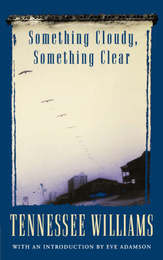
|
Something Cloudy, Something Clear
Paperback / softback
Main Details
| Title |
Something Cloudy, Something Clear
|
| Authors and Contributors |
By (author) Tennessee Williams
|
| Series | Modern Plays |
|---|
| Physical Properties |
| Format:Paperback / softback | | Pages:96 | | Dimensions(mm): Height 196,Width 126 |
|
| Category/Genre | Plays, playscripts |
|---|
| ISBN/Barcode |
9780413706508
|
| Classifications | Dewey:812.54 |
|---|
| Audience | |
|---|
|
Publishing Details |
| Publisher |
Bloomsbury Publishing PLC
|
| Imprint |
Methuen Drama
|
| Publication Date |
2 December 1996 |
| Publication Country |
United Kingdom
|
Description
Tennessee Williams is one of the finest dramatists of the 20th century; his plays are produced around the world Never before published outside America, Something Cloudy, Something Clear is, by Tennessee Williams' own admission "one of the most personal plays I've ever written". Set in Provincetown, Cape Cod, in 1940, the play records Williams' experiences during that "pivotal summer when I took sort of a crash course in growing up". Eve Adamson, the original director of the play said of it: "Two times, two selves, two sensibilities exist simultaneously in August [the central character]. But also, hovering around and permeating the entire dramatic poem, is the double exposure of Tennessee Williams: the artist and his art, the man and his theatrical persona...time stopped and time flowing."
Author Biography
Tennessee Williams (Thomas Lanier Williams; 1911-83) was a US playwright, whose controversial plays dealt with themes of repressed sexuality and family conflict. Williams was the most popular playwright in America between 1945 and 1960, winning the Pulitzer Prize twice and the New York Drama Critics' Circle Award four times. Amongst serious playwrights, only Eugene O'Neill equalled his achievements on the Broadway stage; several of Williams's plays were also made into successful films. The son of a shoe salesman, Williams grew up in some poverty in Mississippi and Missouri. Many of his early frustrations, which are reflected in his plays, arose from the prudery of his mother and the coarseness of his womanizing father, who, as his son's homosexuality became apparent, invariably referred to him as 'Miss Nancy'. The playwright revealed his homosexuality in his Memoirs (1975), having previously explored the subject in Cat on a Hot Tin Roof and Suddenly Last Summer. Williams tried his hand at fiction and poetry before turning to drama in the late 1930s, winning a Theatre Guild prize for the four one-act plays entitled American Blues in 1939. Recognition as a major playwright came with The Glass Menagerie, a tender work inspired by the tragic life of his sister, a schizophrenic. His next play, the brutal A Streetcar Named Desire, opened in 1947, winning the Pulitzer Prize and making a star of Marlon Brando. It was followed a year later by Summer and Smoke. In 1949, these three plays were running simultaneously in London. His later works included The Rose Tattoo (1951), Camino Real (1953), Orpheus Descending (1957), and SWEET BIRD OF YOUTH (1959), which opened with Paul Newman and Geraldine Page in the leads. By the late 1950s, Williams was being accused of repeating himself, and after Period of Adjustment (1960) and The Night of the Iguana (1961), his plays were received unenthusiastically. During his later years, Williams became increasingly dependent on drugs and alcohol, suffering a nervous breakdown in 1969. He died in 1983.
|